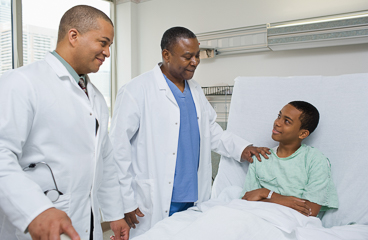Sedation in Children: Care Instructions

Overview
Your child may get a mix of sedatives (medicine to help them relax or fall asleep) and analgesics (medicine to help with pain) when they have a procedure or surgery. Being very relaxed or asleep from the medicines is called being sedated or having sedation.
Sedation is the use of medicine to help your child relax or fall asleep during a procedure. The medicine may be given by mouth, in the nose with drops or a mist, or in a vein (by I.V.). Depending on why your child is getting sedation, they may also get numbing medicine.
The doctor will watch your child closely while your child is sedated. They will make sure that your child gets just the right amount of sedative. Your child also will be watched closely after the procedure.
Your child may be unsteady after having sedation. An older child may have trouble walking. A baby may be unsteady when sitting or crawling. It takes time (sometimes a few hours) for the medicine effects to wear off.
It's common for a child to feel sleepy after sedation. A baby might sleep more than usual or be hard to wake up. The doctors and nurses will make sure that your child isn't too sleepy to go home.
Your child may have nightmares or trouble sleeping for up to 24 hours after having sedation. Sitting with your child in a quiet, dark room may help them sleep.
Follow-up care is a key part of your child's treatment and safety. Be sure to make and go to all appointments. Call your doctor or nurse advice line (811 in most provinces and territories) if your child is having problems. It's also a good idea to know your child's test results and keep a list of the medicines your child takes.
How can you care for your child at home?
Rest
Getting enough sleep will help your child recover. Your child may feel extra sleepy for up to 24 hours after the procedure. A baby may sleep longer between feedings. If your child does fall asleep, wake them up after 2 hours to check how they’re doing. Do this 2 times, then have your child rest when they feel tired.
Eating and drinking
In the first 2 hours after the procedure, only give your child clear fluids (for example, water or apple juice). For a baby, your doctor will tell you if you need to change anything about how you feed them.
After a few hours, allow your child to eat and drink their normal diet, unless your doctor has given you special instructions. If your child's stomach is upset, try clear liquids and foods that are low in fat and fibre. These include applesauce, baked chicken, crackers, and yogurt. If your baby has started to eat solid foods, your doctor will tell you what and when to feed your baby after sedation.
Give your child plenty of fluids to drink, enough so that their pee is light yellow or clear like water. If your child can’t have a lot of fluids because of a health problem, talk with your doctor before you give them extra fluids.
Medicines
Be safe with medicines. Have your child take medicines exactly as prescribed. Call your doctor if you think your child is having a problem with their medicines. You will get more details on the specific medicines your doctor prescribes.
If you think the pain medicine is making your child sick to their stomach:
- Give your child the medicine after they eat a meal (unless your doctor has told you not to).
- Ask your doctor for a different pain medicine.
If the doctor prescribed antibiotics for your child, follow the directions for how to take them. Don’t have your child stop taking them just because they feel better. Your child needs to finish the whole prescription.
When should you call for help?
Call 911 anytime you think your child may need emergency care. For example, call if:
- Your child has trouble breathing. Symptoms may include:
- Shortness of breath.
- Noisy breathing.
- Using the belly muscles to breathe.
- The chest sinking in or the nostrils flaring when your child struggles to breathe.
- Your baby is limp and floppy like a rag doll.
- Your child is very sleepy and is hard to wake up.
- Your child passes out (loses consciousness).
Call your doctor or nurse advice line now or seek immediate medical care if:
- Your child has new or worse nausea or vomiting.
- Your child has a fever.
- Your child has a new or worse headache.
- The medicine isn't wearing off and your child can't think clearly.
- Your baby can't stop crying.
- Your baby won't eat within several hours after leaving the hospital.
Watch closely for changes in your child's health, and be sure to contact your doctor or nurse advice line if:
- Your child does not get better as expected.
Where can you learn more?
Go to https://www.healthwise.net/patientEd
Enter X193 in the search box to learn more about "Sedation in Children: Care Instructions".
Adaptation Date: 09/21/2022
Adapted By: Alberta Health Services
Adaptation Reviewed By: Alberta Health Services
